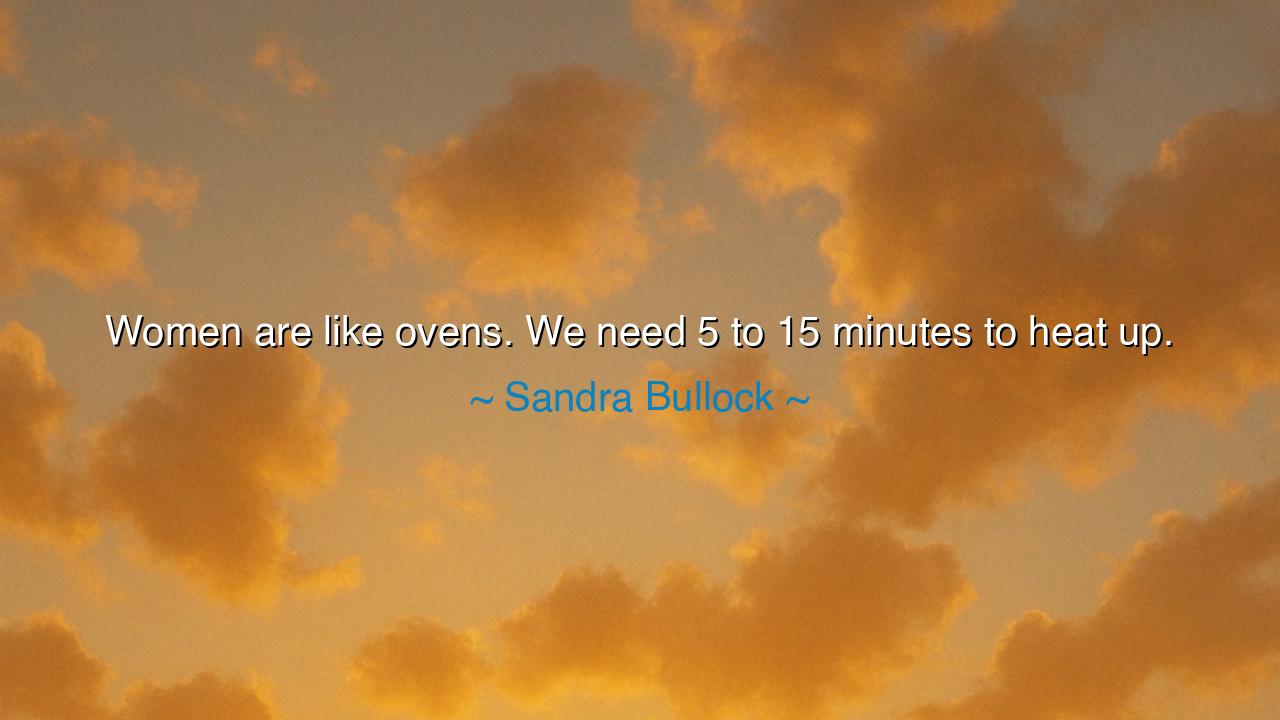
Women are like ovens. We need 5 to 15 minutes to heat up.






The words of Sandra Bullock — “Women are like ovens. We need 5 to 15 minutes to heat up.” — spoken with humor, carry within them a wisdom that speaks not only of romance but of understanding and patience. Cloaked in jest, this metaphor reflects the truth that women are not to be rushed or demanded upon, but approached with care, gentleness, and time. It is a reminder that love is not a spark struck hastily, but a flame kindled slowly until it glows with steady warmth.
The meaning is both playful and profound. The oven is not cold, nor is it unwilling, but it must be given its time to awaken, to gather its strength, to prepare for its true purpose. So too are women, whose hearts and spirits respond not to haste, but to tenderness, trust, and patience. To heat up is to open, to welcome, to move from guardedness to affection. The lesson is not only about intimacy, but about respect — that connection cannot be forced, only nurtured.
History offers us countless examples of this truth. Consider the courtly love of medieval Europe, where knights would serve their ladies with songs, deeds, and devotion before receiving even a smile in return. Though often bound by ritual, the essence was clear: to win the heart of a woman required time, effort, and reverence. Or think of Abigail and John Adams, whose letters over decades reveal the steady growth of trust and passion, not born in an instant, but cultivated patiently, like an oven slowly warming to life.
Bullock’s humor also dismantles impatience. In a world that often demands speed and instant gratification, her words remind us of the sacred slowness of love. To rush intimacy is to cheapen it, but to allow the heat of affection to rise in its own time is to taste the fullness of joy. It is a lesson in waiting, in cherishing the process rather than seeking only the end.
Let this wisdom endure: whether in romance or in life, the most enduring fires are not those that flare and die, but those that are patiently kindled. Women, like ovens, reveal their warmth not at command, but when given the space to awaken. Sandra Bullock’s jest, though lighthearted, shines with an ancient truth — that love, respect, and passion are born not in haste, but in patience, and in honoring the time it takes for the heart to glow.






NLVu Nguyen Nhat Linh
This quote is a playful take on the idea of women needing time to warm up, but I feel it could unintentionally reinforce outdated notions about women’s emotional states. Why do we so often depict women as being 'slow to heat up' while expecting men to be more immediately responsive or active? Is this just a humorous metaphor, or does it tap into deeper societal expectations about women’s roles?
BTHoa Bui Thi
Sandra Bullock’s quote is funny, but I wonder if it reflects the way women’s energy is sometimes perceived in society. Does it imply that women need time to get 'in the mood' or 'ready' for action? In a world that increasingly values equality, shouldn’t we avoid reinforcing these stereotypes? Could the metaphor also perpetuate the idea that women are slower or need more time to engage than men?
GKpham gia khiem
The metaphor in this quote is amusing, but it also feels a bit limiting. Why are women often compared to inanimate objects, like ovens, in this way? Does it suggest that women’s energy or drive is conditional or passive, whereas men are expected to be always 'on'? How can we challenge these ideas and move beyond stereotypes that define us based on gender, rather than personality or circumstances?
LMlinh manh
I think Sandra Bullock's statement is meant to be humorous, but it also raises an interesting point about how we talk about women’s emotions and energy. Does the 'heating up' metaphor play into the idea that women need to be 'warmed up' before they can fully engage? Is that fair, or does it limit how we see women in terms of their full range of energy, emotions, and capabilities?
MAVan ngoc minh anh
Sandra Bullock's quote is definitely playful, but it also seems to reinforce some outdated stereotypes about women. The idea that women need time to 'heat up' suggests that there’s a ‘slow start’ to their energy or enthusiasm, which could be taken as a reflection of gendered expectations. Why is it that we often place these expectations on women? Shouldn't enthusiasm or energy be individual and not tied to gender?